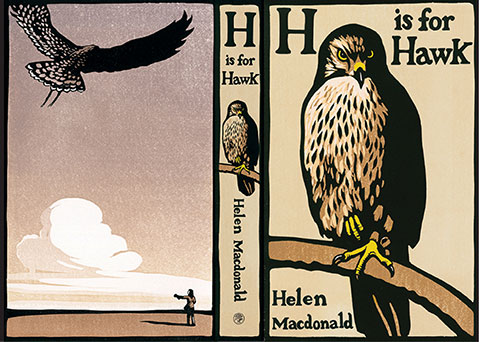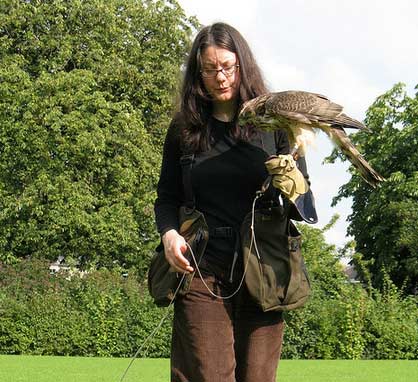Helen Macdonald’s ‘H Is for Hawk’ Soars
Acclaimed Author Comes to Santa Barbara April 1

“I remember pacing up and down my room in an agony of worry because I really thought that my publisher would hate it and no one would read it,” confessed H Is for Hawk author Helen Macdonald in a recent phone interview with The Santa Barbara Independent. “So it’s all been a bit of a shock that it’s gone so well.” In fact, since publication in 2014, the book has been a New York Times best seller, was named Costa Book of the Year, and garnered Macdonald the prestigious Samuel Johnson Prize.
It’s no wonder, really, as H Is for Hawk is a tantalizing, multipronged story that explores our relationship to nature, lays bare the grief of a loved one’s passing, and gives fascinating insight into the influential, troubled author T.H. White. Macdonald elaborated, “A woman said to me once, ‘This is a book that isn’t just for someone who’s interested in birds or had a big loss or someone who wants to know about the English countryside. This is a book for anyone who’s ever wanted to escape their life or any bad circumstances or bad times.’” In other words, everyone.

It’s a brilliant book, and I love that readers have been so receptive to a nonfiction, semi-historical, biographical nature book.
I think what’s happened is that people who wouldn’t normally be attracted by nonfiction or attracted by grief memoirs or by hawks — they come to it because of one strand of the book, and then they find it interesting, too, hopefully.
I can’t imagine having a raptor in my living room.
[Laughs.] It was interesting. There are so many books that take the form of people striking out into the wild … but I guess what I did is a bit weirder: I brought wildness inside my house. And that in some ways was pretty dangerous. There was no escape [from] domesticity … and the house became pretty wild as a result. But [Mabel the goshawk] bridged a lot of different worlds. She’d go out in the day, and I’d watch her fly, and she’d be this transcendent, wild creature, scorching her way around these hillsides and catching her dinner and being the wildest you’ve ever seen. And then I’d bring her back, and I’d have a cup of tea; she’d watch telly. There’s a program called The Bill, which is a British procedural police drama … and the opening has a kind of siren noise, and she used to love that.
T.H. White was another interesting thread in your book.
When I was really small, I read this book, The Goshawk, that he wrote about trying to train a goshawk in the 1930s. … I didn’t understand why [White] treated the hawk so badly. I didn’t know why he would write a book about not knowing how to train a hawk, and I just hated it. And somewhere deep down in my childish mind, I think I thought, One day I’m going to write a book about training a hawk that shows people that it’s not this horrendous sort of episode of domination over a wild creature. It’s this much more generous relationship that’s marked by trust and reciprocation on both sides. And then when my father died, part of the reason that I unconsciously was drawn to a goshawk was [White’s] book … I wanted to somehow get inside his mind and write a kind of creative, imaginative biography of him, a sort of shadow biography.
How long did it take you to write this book?
It took me five years to get around to writing it … [and then] a year and a half full-time that involved a lot of swearing and, I hate to say, a lot of chain smoking, a lot of junk food, and occasionally there were days when I was just curled up under my desk, weeping, because I thought I couldn’t do it. And then there were days I thought I was amazing because I’d write 2,000 words in one go. And this is the great self-absorption of writing a book.
What is the book to you now? So many threads of your life went into it.
Well, I think it belongs to the readers now. I have this really strong sense that when you finish anything like a book or a poem or a piece of art or anything that you’ve made, it’s like making a cake. You pick it up and put it on the shelf or give it to someone, and it’s theirs. So the book is a really strange thing for me in that regard; it’s not me anymore. It’s not something that I have anything to do with, but it’s something that I can talk about.
4·1·1
UCSB Arts & Lectures presents an evening with Helen Macdonald on Friday, April 1, at 7:30 p.m. at the New Vic (33 W. Victoria St.). Call (805) 893-3535 or visit artsandlectures.sa.ucsb.edu.



